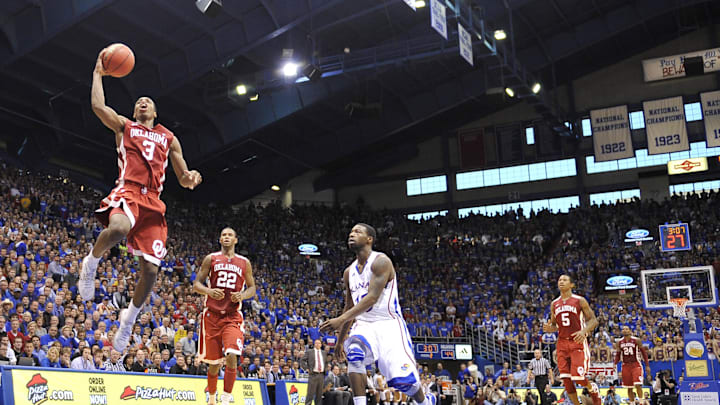There is little question which sport rules the roost at Oklahoma. Football has been, is and forever will be king of Oklahoma athletics.
That situation is not only dictated by economics but a longtime history of winning -- OU has the sixth winningest college football program of all-time -- and the national recognition, ticket revenue and fan interest naturally generated from that.
Oklahoma basketball hasn't realized the same success on a championship scale as its football brethren -- or several other Sooner athletic programs, for that matter -- but both the Sooner men and women have played in their share of big games and achieved national notoriety on the hardwood.
Although the Sooner men had only moderate success through the school's first seven decades of college basketball, the 1938-39 Oklahoma teams played in the first NCAA Final Four in San Francisco, California, losing to Oregon 55-37 in the national semifinal. That Sooner team was coached by Bruce Drake, whose 1946-47 OU team made a return trip to the Final Four, falling to Holy Cross 58-47 in New York City for the national championship
It would be another 30-plus years before Oklahoma basketball would return to national prominence. But the period between 1980 and 2006 may ultimately go down as the golden era of Oklahoma men's basketball.
"Billy Ball" era at Oklahoma (1980-1994)
Billy Tubbs took over as head coach of the Oklahoma men in 1980 and stayed on the job through the 1993-94 season before handing off the baton voluntarily to Kelvin Sampson. Tubbs and Sampson's teams combined for 612 wins in 26 seasons, approximately 1/3 of Oklahoma's 1,775 all-time wins.
Between those two coaching giants, the Sooners appeared in 20 NCAA Tournaments and won five Big 8/Big 12 regular-season championships.
Tubbs' 1984-85 Oklahoma team, ranked No. 4 in the nation and led by the late, great Wayman Tisdale and Darryl "Choo Kennedy, reached the Elite Eight of the NCAA Tournament before losing to Memphis, 63-61.
Three years later, with offensive firepower provided by Stacey King, Harvey Grant and Mookie Blaylock, OU made it all the way to the Final Four for the third time in program history and faced Kansas in the national championship.
The Sooners had beaten fellow Big 8 foe Kansas twice in the regular season, but shockingly lost to the Jayhawks 83-79 in what still stands today as Oklahoma's best chance in the NCAA Tournament era to win a national championship in men's basketball.
Tubbs, the winningest head coach in OU men's basketball history in terms of total wins (333), elected to step down from his coaching position at Oklahoma following the 1994-95 season. His first season at Oklahoma, in 1980-81, the Sooners were 9-18 overall, his only losing season in Norman. After that, Tubbs' teams ran off 12 straight seasons of 20 or more wins.
At the time of his resignation, Tubbs reportedly said he did not feel appreciated enough working at a football school. He might have resigned from the OU job, but he didn't retire from coaching. He went on to coach eight seasons at TCU followed by three at his alma mater, Lamar.
Tubbs died in Norman in 2020, 14 years after his last year coaching. He was 85 when he died after a five-year battle with leukemia.
The rise and fall of 'Mr. Blue Shirt' at Oklahoma
Sampson followed Tubbs at Oklahoma, coming to Norman as a relative unknown after a seven-year run with moderate success as the head coach at Washington State. Sampson inherited a 15-13 OU team from Tubbs and led the Sooners to a 23-9 record and an NCAA Tournament appearance in his first season in 1994-95.
OU qualified for the NCAA Tournament in 11 of the 12 seasons Sampson was at Oklahoma -- including a Final Four appearance in 2001-02 -- and his .722 (279-109) overall winning percentage is the best of the Sooners' 14 all-time head coaches.
Ten of Sampson's 12 Oklahoma basketball teams achieved 20 or more wins, including 31 wins in 2001-02.
Although Sampson left Oklahoma after the 2005-06 season to become the head coach at Indiana, his departure was later smeared in disgrace when it became known that Oklahoma was under investigation for recruiting violations under Sampson's watch.
Regardless of what ill will Sooner Nation might still hold against Sampson, it cannot be denied that Oklahoma basketball, especially during the first seven years of the 2000s, was viewed as a legitimate national power. Those times have been few and far between since.
What have you done for me lately? ...
Oklahoma had some success in the two seasons Blake Griffin was at Oklahoma, winning 23 games in 2007-08 and 30 the following year, along with an Elite Eight appearance in the NCAA Tournament. Griffin was the National Player of the Year in 2009 and the only OU player to be selected No. 1 overall in the NBA Draft in 2009.
Lon Kruger, who spent more than 35 years as a head coach in the college ranks, finished his career at Oklahoma, going 195-128 over a 10-year period. His 2015-16 Sooner team, featuring Buddy Hield, another OU star to earn National Player of the Year honors, finished the season 29-7 and became the fifth Oklahoma team to advance to the Final Four.
Oklahoma's 1,775 all-time wins (including the 14 this season) ranks 34th all-time among NCAA Division-I programs. Not so bad for a school who had a president once say, "We want to build a university our football team can be proud of."
